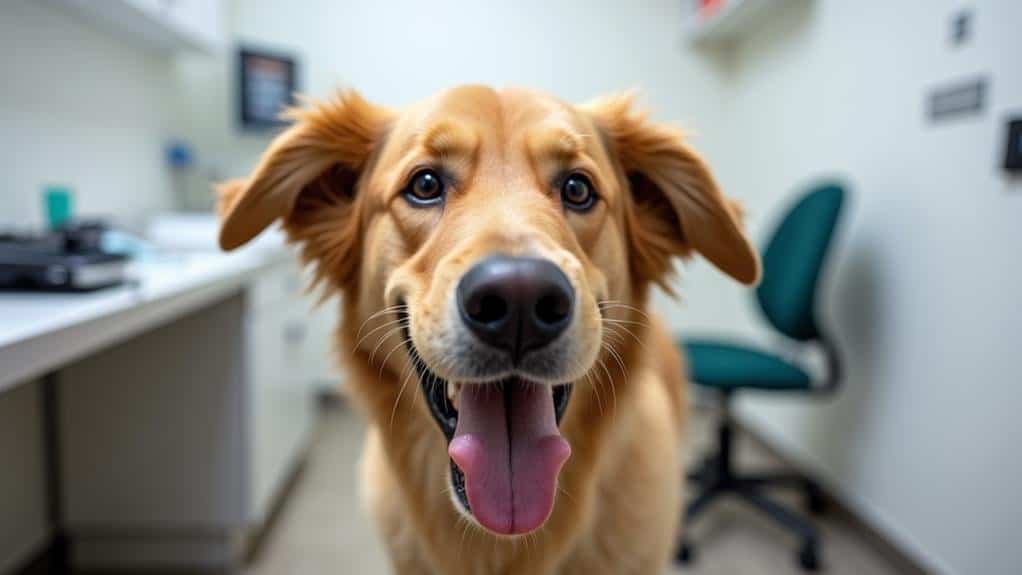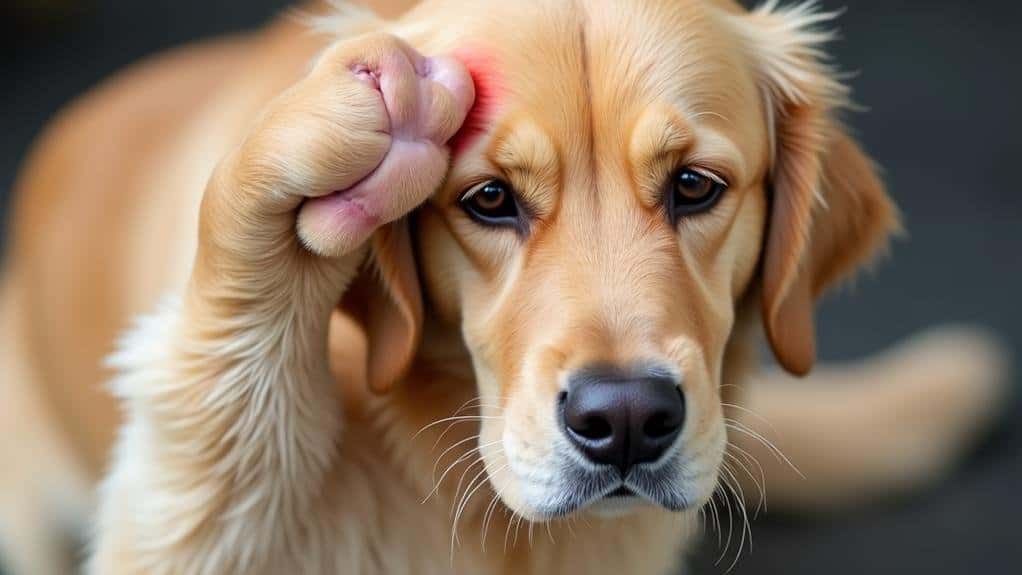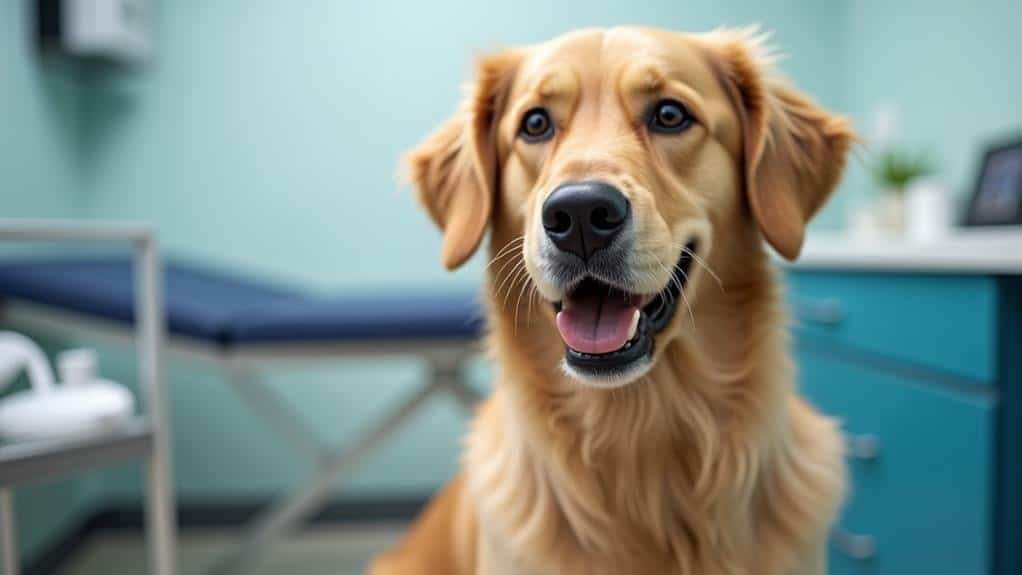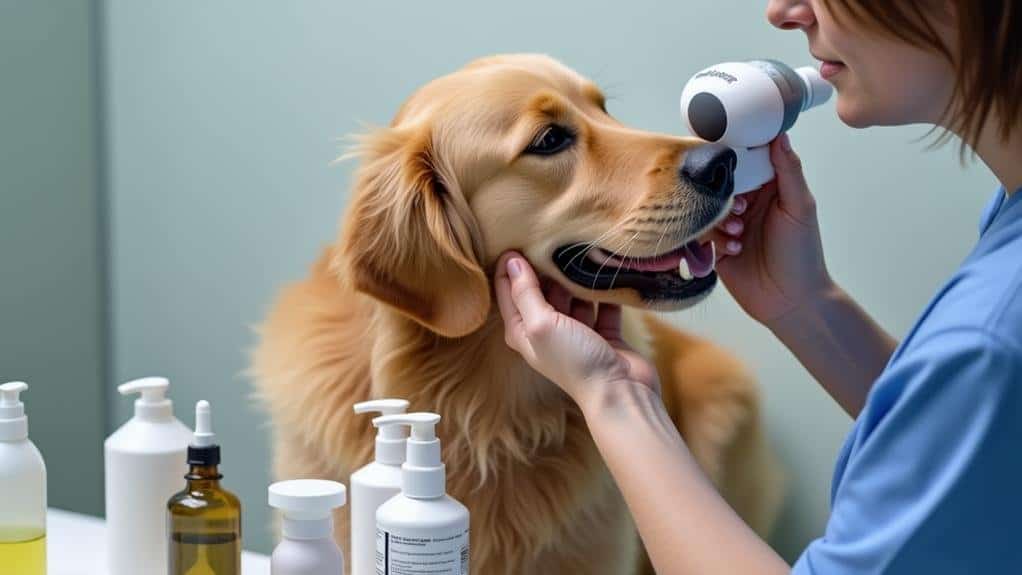If your dog's shaking its head frequently, it's likely experiencing ear discomfort. Common culprits include ear infections, allergies, or pesky foreign objects lodged in the ear canal. These issues can cause itching, irritation, and even pain, prompting your pup to shake its head for relief. While occasional head shaking is normal, persistent or excessive shaking warrants attention. Keep an eye out for other symptoms like redness, swelling, or discharge from the ears. Regular ear cleaning and check-ups can help prevent many of these problems. If you're concerned about your dog's head shaking, there's more to learn about causes, treatments, and when to see a vet.
Common Causes of Head Shaking

From ear infections to allergies, there are several common reasons why your dog might shake its head frequently. Let's explore some of the most typical culprits behind this behavior:
1. Ear Infections
Bacterial, yeast, or fungal infections can cause inflammation and discomfort in your pup's ears, leading to head shaking. If you notice a foul odor or discharge, it's time for a vet visit.
2. Allergies
Whether it's food-related or environmental, allergies can make your dog's ears itchy and irritated. This discomfort often results in excessive head shaking as your furry friend tries to find relief.
3. Foreign Objects
Sometimes, small items like grass seeds can get lodged in your dog's ear canal. Your pooch might shake its head repeatedly to try and dislodge these pesky intruders.
4. Ear Mites
These tiny parasites can cause major irritation, prompting your dog to shake its head like it's at a rock concert.
5. Serious Health Concerns
While less common, chronic head shaking could signal more severe issues like tumors or neurological disorders. If the shaking persists, don't hesitate to seek veterinary attention for a proper diagnosis and treatment plan.
Ear Infections in Dogs

The incessant head shaking of your furry friend might be a telltale sign of an ear infection. Ear infections, or otitis externa, are the most common culprits behind this behavior in dogs. If you notice your pup shaking its head frequently, it's time to pay attention to other symptoms that might indicate an infection.
Signs to Watch For:
- Redness and swelling in the ear
- Unpleasant odor coming from the ear
- Discharge or buildup in the ear canal
- Excessive scratching at the ears
- Signs of discomfort or irritation
If you spot these symptoms, don't wait to seek help. A veterinary consultation is essential for proper diagnosis and treatment.
Your vet will likely perform an otoscopic examination to get a clear view of your dog's ear canal and assess the situation.
Treatment typically involves prescribed ear drops and possibly oral medications. In some cases, your vet might need to clean the ear canal to guarantee the treatment's effectiveness.
Allergies and Itchy Ears

Allergies can set off a chain reaction of discomfort for your dog, often manifesting as itchy ears and persistent head shaking. If you've noticed your furry friend constantly scratching their ears or rubbing their face, allergies might be the culprit.
These pesky reactions can be triggered by various environmental factors or even certain food ingredients, leading to discomfort in the ear region.
When allergies strike, your dog's ears become itchy and irritated, prompting them to shake their head frequently. This behavior, combined with ear scratching, is their way of trying to find relief.
Unfortunately, these actions can sometimes lead to recurrent ear infections, making the problem even worse.
To help your pup, it's essential to identify the specific allergens causing trouble. Your vet might recommend:
- Elimination diets to pinpoint food allergies
- Allergy testing for environmental triggers
- Antihistamines or corticosteroids for symptom relief
- Specialized ear cleaning solutions to soothe irritation
Foreign Objects and Trauma

Discomfort can arise from unexpected sources when it comes to your dog's ear health. Foreign objects, like pesky grass seeds or tiny irritants, can find their way into your furry friend's ear canal, causing quite a ruckus. When this happens, you'll likely notice your pup shaking their head like they're at a rock concert. It's their way of trying to dislodge the unwelcome guest!
Even the tiniest intruders can lead to major irritation in your dog's sensitive ears. This inflammation can trigger even more head shaking, creating a vicious cycle.
But it's not just foreign objects you need to watch out for. Trauma to the ear, which can happen during playtime or exploration, can also cause symptoms like:
- Excessive head shaking
- Ear pain
- Lethargy
- Increased scratching
If you notice sudden changes in your dog's behavior, like they've become a professional head-shaker overnight, it's time to call the vet.
Prompt veterinary care is essential for safely removing foreign objects or evaluating trauma. Don't wait – early intervention can prevent complications and keep your pup's ears in tip-top shape!
Neurological Issues and Head Shaking

While physical irritants often cause head shaking, sometimes the issue lies deeper within your dog's nervous system. Neurological issues can manifest as involuntary head shaking or trembling movements, which might leave you wondering what's wrong with your furry friend. Conditions like cerebellar hypoplasia or idiopathic head tremors can be behind these puzzling behaviors.
If you notice your dog shaking their head frequently, especially if it's accompanied by muscle twitches or a lack of coordination, it's time to pay attention. These could be signs of severe neurological symptoms that require immediate veterinary evaluation.
Don't panic, though – early intervention is key to managing these conditions effectively.
Here are some important points to keep in mind:
- Unvaccinated dogs are at higher risk for canine distemper virus, which can cause neurological issues.
- Head shaking may be just one symptom among others, like abnormal behavior or balance problems.
- Diagnosis often requires advanced tests, including imaging studies.
- Some neurological conditions can worsen over time, so don't delay seeking help.
Prevention and Home Care

After understanding the potential causes of your dog's head shaking, it's vital to focus on prevention and home care. You can take several steps to keep your furry friend comfortable and reduce the likelihood of ear-related issues.
1. Ear Hygiene:
Regularly clean your dog's ears using veterinarian-recommended solutions to remove debris and prevent infections. This simple routine can go a long way in avoiding those pesky head shakes.
2. Water Protection:
When bathing your pup or taking them for a swim, use cotton balls to protect your dog's ears from water. This helps prevent moisture from getting trapped and causing irritation.
3. Allergen Management:
Monitor your dog's environment for potential allergens and keep a diary to identify specific triggers. This detective work can help you minimize your dog's exposure to irritants.
4. Nutrition:
Provide a balanced diet with high-quality ingredients to minimize food allergies. A happy tummy often leads to happy ears!
5. Veterinary Care:
Schedule routine veterinary check-ups to catch early signs of ear infections or other health issues. Your vet can offer guidance on proper ear care and help you address any concerns before they become major problems.
When to Consult a Veterinarian

Recognizing when to consult a veterinarian about your dog's head shaking is essential for maintaining your pet's health.
While occasional head shaking is normal, persistent or excessive head shaking can indicate underlying health conditions that require professional attention.
Here are some key signs that it's time to schedule a veterinary appointment:
- Persistent head shaking: If your dog's head shaking continues for more than a day, it's vital to have them checked out.
- Signs of discomfort: Look for redness, swelling, or discharge from the ears, which may indicate an infection or other issue.
- Additional symptoms: If your furry friend shows signs of lethargy, loss of appetite, or behavioral changes along with head shaking, don't wait to seek help.
- Excessive head shaking: This can lead to complications like aural hematomas, so early intervention is key.
Diagnosing Head Shaking Problems

Once you've decided it's time to consult a veterinarian, they'll employ various diagnostic techniques to identify the root cause of your dog's head shaking. Your vet will start with a thorough examination of your pup's ears, using an otoscope to peek inside the ear canal. This nifty tool helps them spot any foreign objects, excessive wax, or signs of infection that might be causing your furry friend's discomfort.
If your vet suspects an ear infection, they'll likely take a swab of your dog's ear canal. This sample can reveal whether pesky bacteria, stubborn yeast, or even tiny ear mites are to blame for the persistent head shaking.
In some cases, your vet might need to clean out your dog's ears to get a better look or provide immediate relief.
When allergies are on the suspect list, your vet might recommend food trials or allergy testing. These methods can help pinpoint specific triggers causing your pup's itchy ears and head shaking.
Treatment Options for Dogs

Tailored to your dog's specific diagnosis, treatment options can vary widely.
If your furry friend is dealing with ear infections, your vet might prescribe a combination of ear drops and oral medications to combat the pesky bacteria or yeast causing the issue.
For allergic reactions, you're looking at a more investigative approach. Your vet may recommend allergy testing or an elimination diet to pinpoint and manage those troublesome allergens.
Got ear mites? Don't worry, there's a fix for that too! A medicated rinse or topical treatment from your vet will help kick those tiny invaders to the curb.
And if your pup's got something stuck in their ear, it's time for some professional veterinary intervention. They'll safely remove that foreign object before it causes more trouble.
For persistent head shaking, your vet will need to dig deeper to uncover any underlying medical conditions.
Once they've cracked the case, they'll create a tailored treatment plan to address the root cause.
Frequently Asked Questions
What Can I Do if My Dog Keeps Shaking His Head?
If your dog keeps shaking his head, schedule a vet exam to rule out infections or allergies. Check for ear redness, discharge, or swelling. Use cotton balls during baths, inspect ears regularly, and consider allergy testing if needed.
Why Is My Dog Scratching His Ears and Shaking His Head?
Your dog's ear scratching and head shaking could be due to ear infections, allergies, ear mites, or foreign objects in the ear canal. These issues cause discomfort and irritation, prompting your pet to seek relief through these actions.
Does Dog Shaking Head Mean Ear Infection?
Yes, it's likely your dog's head shaking indicates an ear infection. You'll often notice other signs like redness, discharge, or odor. Don't wait; take your pup to the vet for a proper diagnosis and treatment.
Are Head Tremors in Dogs Serious?
Yes, head tremors in dogs can be serious. You shouldn't ignore them, as they may indicate neurological issues or central nervous system disorders. It's essential you consult a vet promptly for proper diagnosis and treatment.
Conclusion
Remember, your dog's head shaking isn't just an annoying habit; it's often a sign they need your help. Keep an eye out for common causes like ear infections or allergies, and don't hesitate to consult your vet if the shaking persists. With proper care and attention, you'll be able to address the underlying issue and get your furry friend back to their happy, shake-free self. After all, a content pup means a happy home for everyone!

